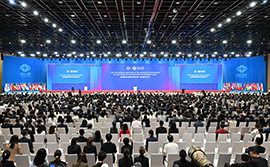

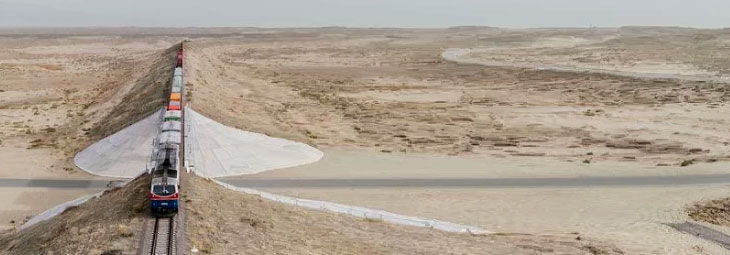
Under the theme “Strengthening Global South Cooperation for More Inclusive and Sustainable Governance,” the 17th BRICS Summit is set to take place in Rio de Janeiro, Brazil, in July 2025.
Experts from various countries believe that this summit will mark the first gathering since the inclusion of new member Indonesia and ten other partner countries into BRICS. Additionally, several emerging markets, developing countries, and international and regional organizations have been invited to participate, enhancing the representation of the summit. This gathering is expected to further promote unity and cooperation among emerging market nations and developing countries, fostering a more equitable and orderly multipolar world and inclusive economic globalization, thereby showcasing a stronger "Southern Power" to the world.
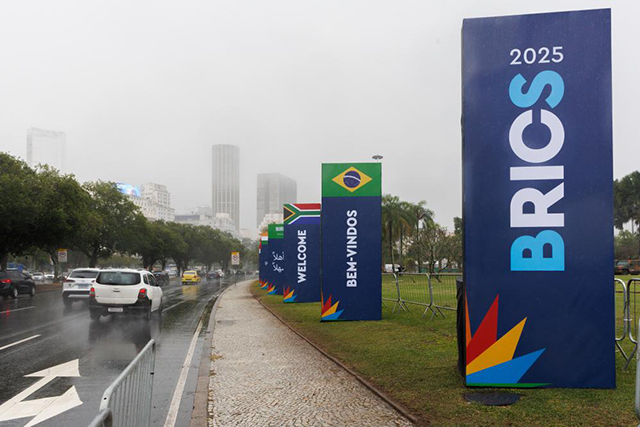
This is a welcome banner for the 17th BRICS Summit, photographed in Rio de Janeiro, Brazil, on July 3. (Photo by Claudia Martini, Xinhua)
Amplifying the Southern Voice
In January 2025, Indonesia will join the BRICS cooperation mechanism, increasing the official membership to 11 countries. In June, Vietnam was formally welcomed as a BRICS partner country. The geographical scope of "BRICS Plus" has expanded, further enhancing its representation and demonstrating the appeal and influence of the BRICS mechanism.
"The representation of the BRICS cooperation mechanism has been broadened, and its impact on the international stage continues to grow, equipping it with a stronger capacity to advance various global agendas," said Veronika S. Saraswati, Director of International Relation Program a Center for Strategic and International Studies.
Today’s BRICS family represents over half of the world’s population and accounts for nearly 30% of the global economy. The rotating presidency of Brazil highlighted on its official BRICS website that according to the International Monetary Fund, the GDP growth rate of BRICS countries is expected to reach 4% in 2024, significantly exceeding the global average of 3.3%.
Ivone Silva, President of the Institute Lula in Brazil, stated that the expanded BRICS nations bring together vital components of the world’s population and economy, and cooperation among BRICS countries creates opportunities for shaping a fairer and more sustainable future.
Experts believe that as the "first echelon" of the Global South, the growth and development of the BRICS mechanism will further strengthen cooperation among Southern countries. Marcos Pires, Director of the Institute of Economic and International Studies at the S?o Paulo State University, noted that the expanded "BRICS Plus" provides a broader strategic dialogue platform for Southern countries, facilitating closer political and economic ties among nations, as well as offering a platform for Global South countries to participate in global governance, defend their development rights, and gain more voice in international discussions.
Promoting Improved Global Governance
The world is currently entering a new period of upheaval and transformation, facing multiple challenges. The global governance deficit is becoming increasingly evident, and the promotion of a more equitable and orderly multipolar world, along with inclusive economic globalization, has become a shared aspiration of the international community, particularly among Southern nations.
As this year's rotating presidency, Brazil has identified six priority areas for BRICS cooperation: global health collaboration, trade investment and finance, climate change, artificial intelligence governance, multilateralism, and security architecture reform. From February to July, BRICS nations held over 100 ministerial and technical meetings in Brazil, aimed at fostering a stronger collective effort among emerging markets and developing countries to advocate for reforms in the global governance system.
Maria Elena Rodriguez, Deputy Director of the BRICS Policy Center in Brazil, noted that the increasing participation of more countries in BRICS cooperation stems from the fact that this mechanism not only provides equal and effective trade and investment opportunities through institutions like the New Development Bank but also creates a platform for countries, especially those in the Global South, to voice their concerns and collaborate on issues such as climate change, international trade, and sustainable development.
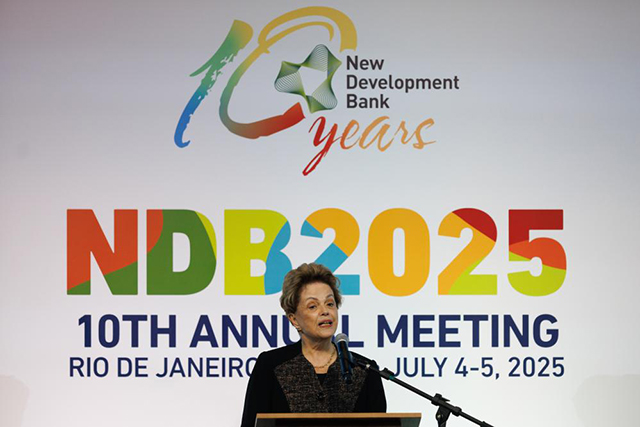
On July 4, at the 2025 Annual Meeting of the New Development Bank held in Rio de Janeiro, Brazil, former Brazilian President and President of the New Development Bank, Dilma Rousseff, delivered a speech. (Photo by Claudia Martini, Xinhua)
Experts believe that in today's world, where geopolitical tensions are escalating and unilateralism and protectionism are on the rise, the BRICS cooperation mechanism's commitment to focusing on peaceful coexistence, openness, inclusivity, and dialogue cooperation is crucial for maintaining multilateralism, promoting common development, and improving global governance, thereby making a significant "BRICS contribution."
Guseletov Boris, Leading Researcher of the Department of Social and Political Studies in the Institute of Europe, Russian Academy of Sciences, stated that the world today faces new challenges related to inequality. The BRICS mechanism helps unite efforts to promote common development and defend multilateralism, contributing significantly to building a fairer global governance system.
Rebecca Lemos, Secretary-General of the Facultad Latinoamericana de Ciencias Sociales, believes that "BRICS Plus" encompasses various aspects, including politics, economics, technology, and culture, creating a new governance model that fosters win-win cooperation and creativity.
Strengthening China's Role in BRICS
Experts from various countries recognize that China has played a significant role in the development of the BRICS mechanism. It has articulated an inclusive and cooperative spirit for BRICS, providing clear direction for the mechanism's growth. China has also promoted the expansion of BRICS nations, broadening areas of cooperation, and is committed to establishing BRICS as a vital platform for collaboration among Global South countries.
Brazilian scholar Pires points out that China is the largest economy within the BRICS cooperation mechanism. The Belt and Road Initiative proposed by China has created additional opportunities for collaboration among BRICS countries and many other developing nations. The Global Development Initiative, Global Security Initiative, and Global Civilization Initiative offer Chinese solutions and wisdom for advancing a more equitable and just international order.
Jonathan Matos, an international political economy scholar at the State University of Rio de Janeiro, noted that the headquarters of the New Development Bank is located in Shanghai, China. The establishment of the Asian Infrastructure Investment Bank, initiated and actively promoted by China, along with initiatives like the Belt and Road, has significantly advanced the high-quality development of "BRICS Plus," further consolidating BRICS nations' leadership role in the rise of the Global South.
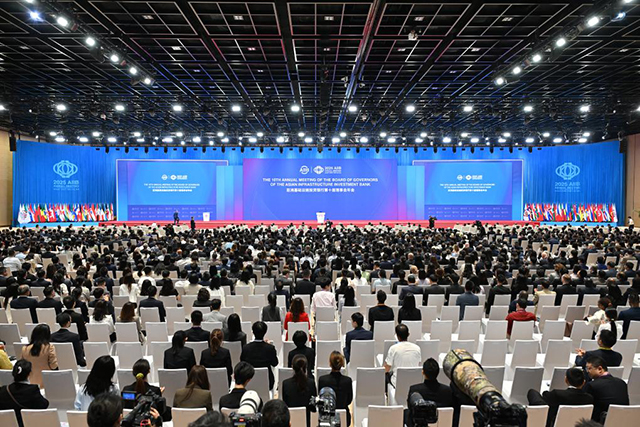
This photo, taken on June 26, shows the opening ceremony of the 10th Annual Meeting of the Board of Governors of the Asian Infrastructure Investment Bank. (Photo by Li Xin, Xinhua)
Experts believe that amid current global turmoil, China is providing opportunities to the world and demonstrating its commitment through persistent and practical actions.
Rodriguez noted that China's concept of building a community with a shared future for mankind is profoundly significant, guiding BRICS countries in their development. "China's vision promotes the establishment of an inclusive cooperation platform among BRICS nations, offering a global governance perspective based on shared consultation, construction, and benefits for all."
Source:BELT AND ROAD PORTAL·YIDAIYILUGOV.CN
Edited and Translated by Chen Xiao